On Father's Day in 2017 I went on what could only be described as an epic fishing trip. Myself and two other members of my family rolled out to catch 100+ keeper speckled trout and left them biting!
It was one of the best, if not the best, summertime speckled trout bites I had ever seen! But there's an important detail about this fishing trip that sets it apart from others: there was a lot of cloud cover.
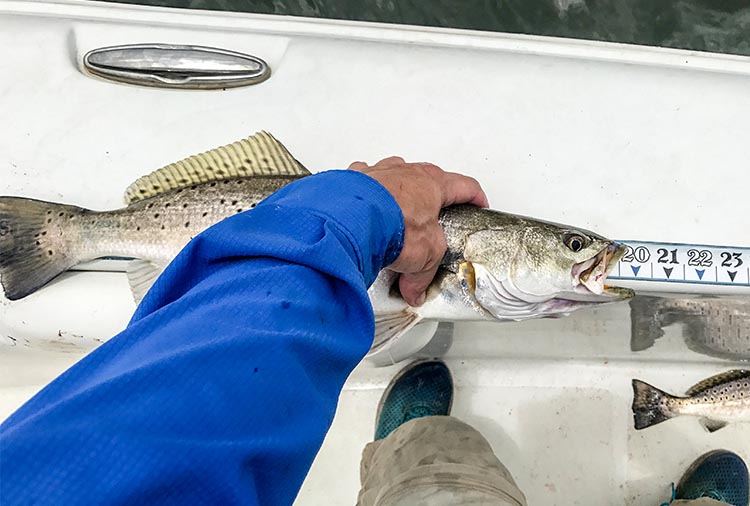
A lot of the fish we caught were around this size. An epic fishing trip!
Why is this a big deal? How did these clouds impact the speckled trout? What occurred on this particular summer fishing trip that set it apart from other days?
To answer these questions we must first look at the best time to launch your boat during summer, when targeting speckled trout.
When is the best time to launch your boat to catch summer specks?
When it comes to speckled trout fishing during the summer, you really want to get out onto the water early.
How early? Well, I can be seen leaving the dock for as early as 5am, especially in June and July around the summer solstice.
The reason for this is because it will get hot which — in turn — causes speckled trout to feed in shorter windows. They will feed while it's still cool then take the rest of the day off to conserve energy.
And that's really the gist of it. If you want to learn more then I suggest visiting this guide to the speckled trout summer pattern.
The point I'm trying to make here is that if you don't get out there to your first fishing spot for the crack of dawn, then you are missing that short, but productive, window to catch them.
The General Rule of Summer is...
...you have until about 9am, maybe 11am to find the speckled trout bite.
Anglers who don't make it happen by then usually spend the rest of the day grinding without much to show for it.
Again, the reason for this rule is because it will get hot. But why does it get hot? Well, because the sun is out cooking the surface of Earth.
But what if that's not the case? What if the water we are fishing is shielded from the sun? This is where cloud cover comes into play.
Why Overcast Weather Is So Good For Speckled Trout Fishing
If there's a thick layer of clouds to shade the area you want to fish, then you can count on speckled trout to respond in a way that is wholly different than if the sky were clear and the sun shining.
While I could be wrong, I personally believe that speckled trout recognize this change in the conditions and take advantage of it by feeding for an extended period of time, possibly the entire day.
They know it's not going to get as hot as quickly as if the sun were out, so their feeding window opens wider.
That is what happened on that summer day in 2017: we got a late start, leaving Hopedale Marina for 8am, and didn't find the fish until 1pm!
It took some bouncing around, but once we found them the bite was on, fast and furious speckled trout action without a single throwback. We easily caught our limit of 75 specks, caught and released some more then headed back to the dock to clean fish.
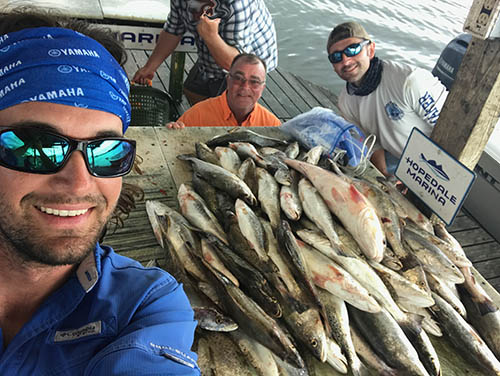
On a bright and bluebird day that fishing trip would have been doomed. But because it was hard overcast and never got hot, the fish were feeding throughout the day.
How Much Cloud Cover Do You Want?
You want all of it. Not partly cloudy. Not a thin blanket that the sun can peak through, you want it to be hard overcast.
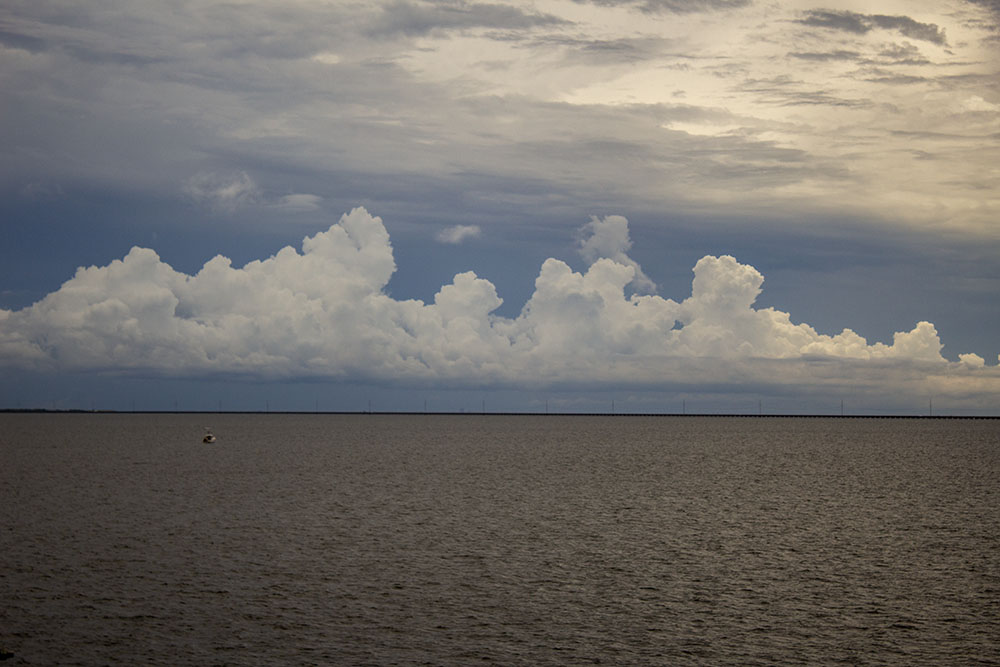
In my experience, it must be hard overcast from the moment the sun rises. I have not found trout to feed through the day if the sun is out in the morning then overcast weather rolls in.
Why do speckled trout prefer overcast weather?
I think that speckled trout prefer overcast weather as a general rule, and not just because of its cooling effect described earlier.
I could be wrong, and am willing to accept that, but it's been my observation that these fish generally bite better when the weather is overcast.
This is especially the case for topwater action, and a great video where you can see that fleshed out is this one on YouTube.
Simply put: they just bit better when the sun wasn't shining. But there's more.
A Quirky Thing My Cameras Caught
I have spent a good deal of time shooting video in the marsh, and accidentally discovered something.
I found that it's much harder to see underwater when the sun is out, especially in shallower water. There's dazzling rays all over the place, like a disco ball that makes it difficult to see.
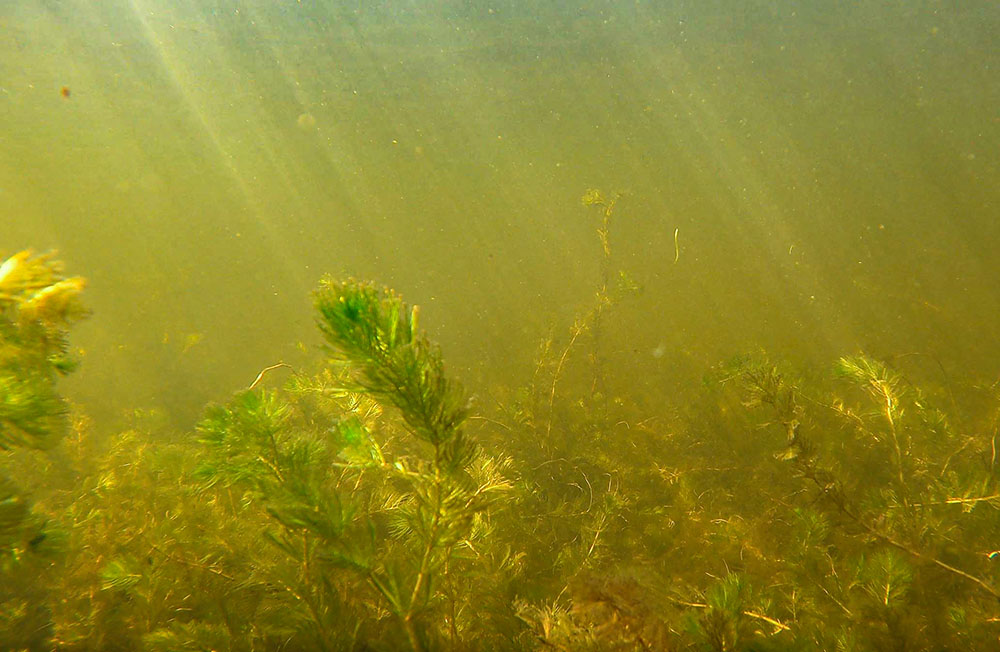
Sunny skies = underwater shimmering
But, when the sky is overcast, it becomes much easier to see underwater, at least for my human eye. There's no dazzling disco ball effect and it's much easier to look up in the water column.
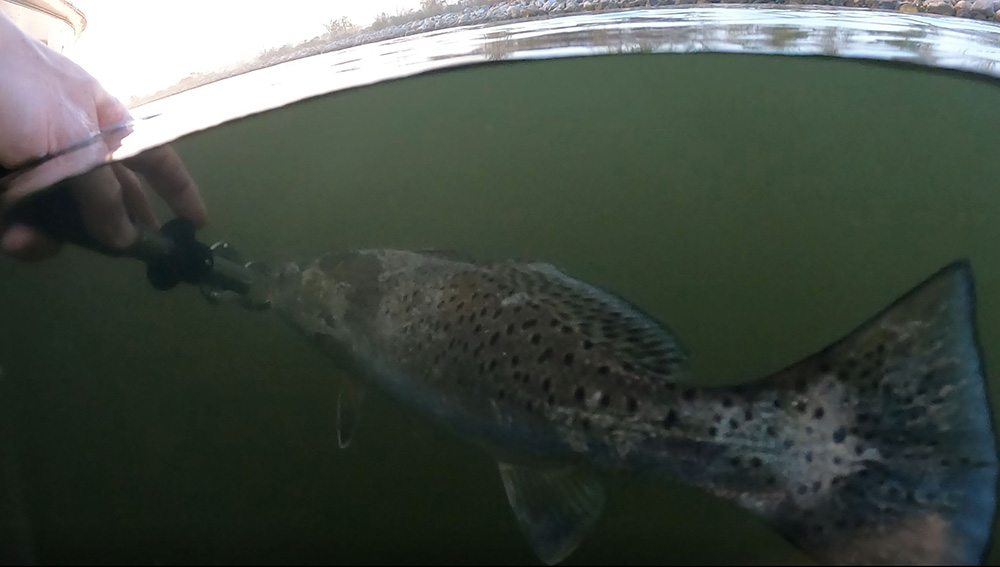
Overcast skies = no underwater shimmering
I can't say anything definitive about this, it's just what I've seen on camera. It's hard to say for sure, but if you've got thoughts on this, then I'd love to hear them!
You'll find the comments section below. Thank you.
What if you don't get on the trout first thing in the morning?
It's reasonable to expect that things may not go your way during a summer speckled trout trip, especially when considering how much has to go right and how much can go wrong.
It's possible that you could fail to locate a good trout bite and then you're stuck with bailing out your fishing trip.
So, what's a good solution?
I recommend rolling to Plan Redfish, since those fish are hardier and tend to feed longer through the day during summer.
My favorite way of doing this is sight fishing! This guide will get you pointed in the right direction.
Or, you can roll to Plan Triple Tail, and start checking anything that floats for that quirky fish. To get started, you should really check out this primer to catching triple tail in Louisiana.
Better Planning For Overcast Speckled Trout
So now that you have this little nugget of speckled trout fishing knowledge in your head, you may be thinking, "Well, how can I plan for overcast weather?"
My favorite way to do this is to use Windfinder. Below the wind forecast you will see a prediction for what the skies will be like.
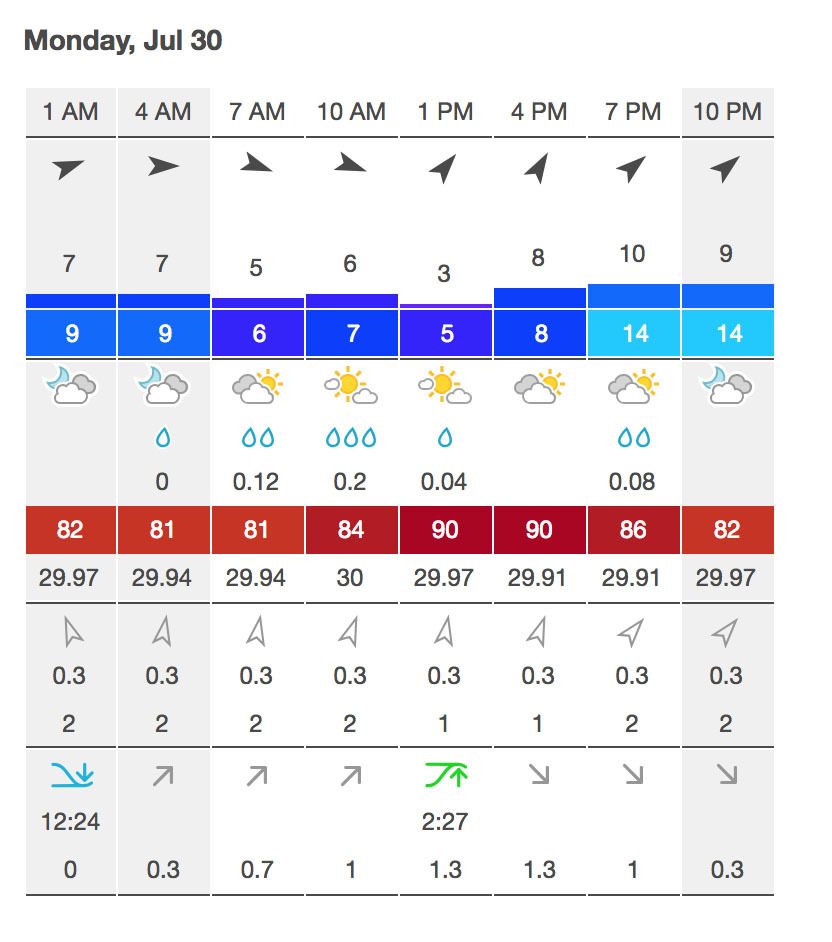
Not familiar with Windfinder? No problem!
In my course Fishing Trip Planning Resources you will discover all the resources I use to plan epic fishing trips. Windfinder is only one of them, but it is the main one that I recommend to anyone trying to figure out where to go fishing.
This course is only available inside my membership LAFB Elite, which successful anglers recommend!
No More Frustration
I too was frustrated with the many times I went and fished all day only to come home with little to nothing.
I have been an Elite member now for a couple of months, and while I haven't loaded the boat yet, I can say that I have learned a lot.
Some of the stuff that Devin teaches, I think that I already was doing but not understanding why. Plus I learned the things that "I didn't know that I did not know".
I am very pleased with LAFB Elite, and recommend it to anyone who's on the fence considering if they should join or not.
Like Devin says: it costs less that a bucket of live shrimp, so what do you have to lose?
Dannie Spivey
Game Changer!
I moved here from Wisconsin and have friends that fish inshore very well.
After completing Inshore Fishing 101 I have seen a lot of things that you laid out to try and do that gives them success, but also there were things in here that could even help them.
The insight alone from MODIS and how to use Google Earth Desktop and the NOAA stations changed the game of how I approach my fishing trips.
I found that the way Captain Devin plans his fishing trips to be much more useful or at least much less time consuming than just running around until I got lucky.
Zachary Cripe
What do you think?
Perhaps you have your own observations that you've seen on the water, or maybe you think I'm missing something else that ties all this summertime speckled trout behavior together?
If so, please comment below!

I would fish it like I would on sunny days, just knowing that the bite could be extended. Thanks for visiting!
FANTASTIC EXPLANATIONS of different conditions, suggestions how to fish and possible results/hopes!?!?
Thank you for taking time to visit my website! I’ve deleted most of Louisiana Fishing Blog’s social media in order to make time to focus on making content here. So, for you to go out of your way to come here means a lot and I hope you have enjoyed the content found here.